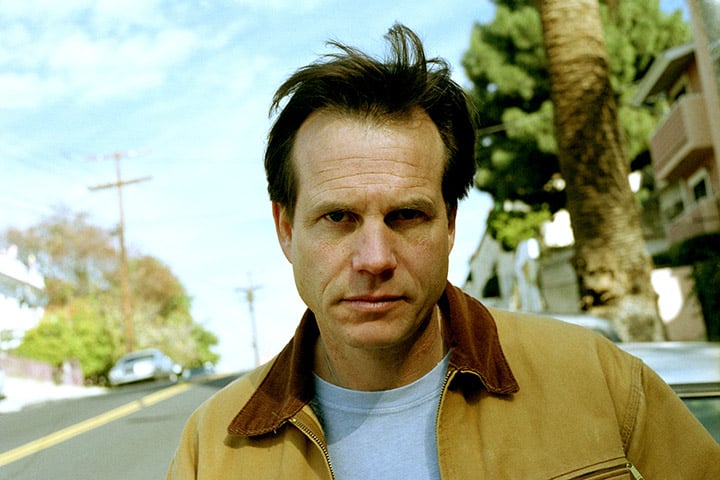I met Bill Paxton in 1995. On a visit to the Rolling Stone offices in midtown Manhattan, he looked in awe at our cover wall, featuring iconic images of rock royalty. An intern, passing by, stopped to stare at him. “Your face looks familiar,” she said.
“I’ve been in a couple of movies,” Paxton said, good-naturedly.
The intern wasn’t buying it. “Which ones?”
“Apollo 13 … it just came out, I’m an astronaut in that one.”
“Which astronaut?” the youngster prodded, skeptical to the last.
Warming to the impromptu interrogation, Paxton flashed what he called his shit-eating grin. “The one that isn’t Tom Hanks or Kevin Bacon,” he said. As the intern moved on, unconvinced, the actor smiled broadly at me. “Story of my life,” he said.
Every time I ran into Paxton in the years since, after most people knew exactly who he was from the dozens of films and TV shows he’d been in, we’d play that game. What are you up to, Bill, I’d inquire. “Just did Titanic,” he’d say. And which one are you, I’d ask.
Love Music?
Get your daily dose of everything happening in Australian/New Zealand music and globally.
“The one who isn’t Leo DiCaprio,” he’d answer, laughing.
It was impossible not to like Bill Paxton, a modest man of immodest gifts. He had a natural warmth that drew people to him, a rare quality in phoney Hollywood. Meeting up with him always sparked stories about his adventures – he was up for anything. A Texas boy to the tips of his boots, Bill loved telling the story of how he was in the crowd when JFK went through Fort Worth, Texas, shortly before he’d be assassinated in Dallas, November 1963. “I was eight years old,” he recalled, still awestruck at seeing the President. A photo of the young Paxton being lifted in the air to get a better look at his hero can still be seen at the Sixth Floor Museum in the Lone Star State.
Paxton liked to say that he was ready to follow in the footsteps of his father as a hardwood salesman. But theatre classes in high school hooked him on the arts. Moving to Los Angeles in his teens, he designed sets for B-movie king Roger Corman, won a bit part in Crazy Mama (directed by up-and-comer Jonathan Demme) and appeared in novelty music videos. He got a big boost from small roles in sci-fi blockbusters that pitted him against the Terminator, xenomorph aliens and a Predator. “I was killed by all of them,” he boasted.
It was his relationship with director James Cameron, who first cast him as a blue-haired punk in 1984’s The Terminator, that kicked his career up a notch. In 1988, the future “King of the World!” Oscar-winner directed a video for Martini Ranch, the new wave band that Paxton formed with his pal Andrew Todd Rosenthal. The two shared an insatiable curiosity, and his roles in the director’s films, including True Lies and Titanic spoke to their shared spirit of adventure. In fact, after making the romance/disaster film blockbuster with Cameron, Paxton signed on with the the filmmaker’s team for the 2003 documentary Ghosts of the Abyss, joining the crew on their expedition to the wreck of the real Titanic. “I was in heaven,” he told me at the time.
Paxton has a list of blockbusters any action star would envy, but our talks about his career most often focused on his smaller films. He felt energised by the role of Dale “Hurricane” Dixon, a police chief tracking a thief played by Billy Bob Thornton in 1992’s One False Move. “It gave me something to chew on,” he recalled. Better yet, there was 1998’s A Simple Plan, again with Thornton as brothers thrown out of moral balance by finding a cache of stolen money in a crashed plane. “There was a real Gothic Americana feel to this movie that made us think we’d accomplished something,” he said. “I think we did.”
If you really wanted to get Paxton going on what film could accomplish, however, you brought up 2002’s Frailty, a criminally underrated passion project that Paxton starred in and directed. “Whatever I had as a filmmaker went into that movie,” he claimed, and he gave what’s arguably his best and most unnerving performance as a Texas widower on a mission from God, eventually recruiting his two young sons to kill demons. We would often talk about the connection between Frailty and Charles Laughton’s chilling The Night of the Hunter, an allegory of innocence and evil released in 1955, the same year Paxton was born. The Robert Micthum movie never found an audience back then; today it’s an acknowledged classic. Here’s hoping that time will do the same for Paxton’s complementary thriller.
The man rarely showed the things that were eating at him, much less complain about them. But one time he admitted an aching desire “to have people re-evaluate me.” He achieved one of his greatest successes on the hit HBO series Big Love, from 2006 to 2011, playing the head of a Utah-based family practicing polygamy. The role won him three Emmy nominations as Best Actor; he won another Emmy nomination for the miniseries Hatfields & McCoys and died just after his new TV series, Training Day, had debuted on CBS.
All I can think of in these hours after his death is that the 61-year-old Bill wasn’t finished – not as a husband, father, friend, actor, filmmaker and citizen of the world. The best tribute we can pay him as a talent is to watch a few of the films that mattered most to him; they paint a fuller picture of what he reached for and what he so gloriously achieved. I can’t play games with Bill anyone about the roles in his next project and ask, “Which one are you?” He’s the one who isn’t here. We are all the less for it.



































